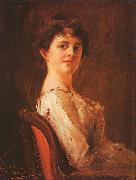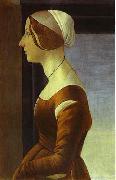
|
Palma Vecchio
|
|||
|
|
|||
| 1480-1528 Italian Palma Vecchio Gallery His birthdate is calculated on Vasari testimony (1550) that he died aged 48. By March 1510 he was in Venice, where he spent his working life. The stylistic evidence of his earliest works suggests that he was apprenticed to fellow Bergamasque artist Andrea Previtali, who had studied under Giovanni Bellini. A signed Virgin Reading (1508-10; Berlin, Gemeldegal.), which may be Palma Vecchio earliest surviving painting, is strongly reminiscent of his teacher. Previtali returned to Bergamo in 1511, and the main corpus of Palma work can be dated from this time. Palma Vecchio oeuvre reflects the change from an early to a high Renaissance conception of the human figure in secular and religious art. He specialized in certain themes that became established in the repertory of genres of the Venetian school in the generation after him. The principal of these were the wide-format SACRA CONVERSAZIONE | |||
|
|
|||
|
Portrait of a Woman Palma Vecchio2.jpg Painting ID:: 1096 |
|||
|
|
|||
|
Mihaly Munkacsy
|
|||
|
|
|||
| 1844-1900 Hungarian Mihaly Munkacsy Locations Munkacsy started to paint during the years he spent in Arad as a joiner. With the help of partons be studied at the Viennese, Munich and Dusseldorf academies. Munkacsy painted his first major work, the outstanding "The Condemned Cell" in D??sseldorf, in 1872, together with his friend Laszlo Paal, he moved to Paris, where be lived until the end of his life. Munkacsy painted his genres in the style of realism between 1873 and 1875: "Midnight Ramblers", "Farewell". "Churning Woman", "Woman Carryng Brushwood", and "Pawnshop" were the zenith of his career. He married the widow of Baron de Marches in 1874, and his style changed from that time on. Departing from the typical subjects of realism, be produced colourful salon paintings and still-lifes. This was the period when be also turned to ladscape painting; his growing interest is marked by such great paintings as "Dusty Road". "Corn Field", and "Walking in the Woods". The assimilation of Laszlo Paal's style is apparent in the landscapes painted during the 1880s, such as "Avenue" and "The Colpach Park". His realist portraits - e.g. of Franz Liszt and Cardinal Haynald - were also born around this time, together with his religions paintings, such as "Christ in front of Pilate", "Golgotha" and later, "Ecce homo". Towards the end of his career he painted two monumental works: "Hungarian Conquest" for the House of Parliament and a fresco entitled "Apotheosis of Renaissance, for the ceiling Kunsthistoriches. Museum in Vienna. | |||
|
|
|||
|
Portrait of a Woman Mihaly Munkacsy19.jpg Painting ID:: 2794 |
1885 Deri Museum, Debrecen | ||
|
|
|||
|
Sandro Botticelli
|
|||
|
|
|||
| Italian Early Renaissance Painter, 1445-1510 Italian painter and draughtsman. In his lifetime he was one of the most esteemed painters in Italy, enjoying the patronage of the leading families of Florence, in particular the Medici and their banking clients. He was summoned to take part in the decoration of the Sistine Chapel in Rome, was highly commended by diplomatic agents to Ludovico Sforza in Milan and Isabella d Este in Mantua and also received enthusiastic praise from the famous mathematician Luca Pacioli and the humanist poet Ugolino Verino. By the time of his death, however, Botticelli s reputation was already waning. He was overshadowed first by the advent of what Vasari called the maniera devota, a new style by Perugino, Francesco Francia and the young Raphael, whose new and humanly affective sentiment, infused atmospheric effects and sweet colourism took Italy by storm; he was then eclipsed with the establishment immediately afterwards of the High Renaissance style, which Vasari called the modern manner, in the paintings of Michelangelo and the mature works of Raphael in the Vatican. From that time his name virtually disappeared until the reassessment of his reputation that gathered momentum in the 1890s | |||
|
|
|||
|
Portrait of a Woman Sandro Botticelli23.jpg Painting ID:: 10003 |
1475Tempera on panel Palazzo Pitti, Galleria Palatina, Florence, | ||
|
|
|||
|
Amedeo Modigliani
|
|||
|
|
|||
| Italian Expressionist Painter and Sculptor, 1884-1920 Amedeo Clemente Modigliani (July 12, 1884 ?C January 24, 1920) was an Italian artist of Jewish heritage, practicing both painting and sculpture, who pursued his career for the most part in France. Modigliani was born in Livorno (historically referred to in English as Leghorn), in northwestern Italy and began his artistic studies in Italy before moving to Paris in 1906. Influenced by the artists in his circle of friends and associates, by a range of genres and art movements, and by primitive art, Modigliani's œuvre was nonetheless unique and idiosyncratic. He died in Paris of tubercular meningitis, exacerbated by poverty, overworking, and an excessive use of alcohol and narcotics, at the age of 35. | |||
|
|
|||
|
Portrait of a Woman Amedeo Modigliani82.jpg Painting ID:: 10621 |
1918, oil on canvas, 24 x 18 1/8 ins (61x46 cm). Denver Art Museum, Charles Francis Hendrie Memorial Collection. | ||
|
|
|||
|
KAUFFMANN, Angelica
|
|||
|
|
|||
| Swiss Neoclassical Painter, 1741-1807 Swiss-born Italian painter. She began studying art in Italy as a child, showing great precocity, and in 1766 her friend Joshua Reynolds took her to London. There she became known for her decorative work with architects such as Robert Adam. Her pastoral compositions incorporate delicate and graceful depictions of gods and goddesses; though her paintings are Rococo in tone and approach, her figures are Neoclassical (see Classicism and Neoclassicism). Her portraits of female sitters are among her finest works. | |||
|
|
|||
|
Portrait of a Woman KAUFFMANN, Angelica1.jpg Painting ID:: 7720 |
1795 Oil on canvas, 131 x 103 cm Museum of Fine Arts, Budapest | ||
|
|
|||
|
Also Buy::. For Following Paintings / Artists / Products, Please Use Our Search Online: |












